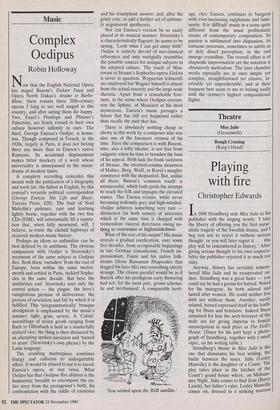Music
Complex Oedipus
Robin Holloway
Now that the English National Opera has staged Busoni's Doktor Faust and Opera North Dukas's Ariane et Barbe- Bleue, there remain three 20th-century operas I long to see well staged in this country, and after seeing them die happy. Two, Faures Penelope and Pfitzner's Palestrina, are firmly rooted in their own culture however infirmly in ours. The third, George Enescu's Oedipe, is home- less. Though composed in French, in the 1920s, largely in Paris, it does not belong there any more than to Enescu's native Rumania. Its accidental displacement makes bitter mockery of a work whose universality is unsurpassed in the music- drama of modern times.
A complete recording coincides this month with the publication of a biography and work list, the fullest in English, by this journal's versatile political correspondent (George Enescu: His Life and Music, Toccata Press, £20). The fruit of Noel Malcolm's patience, care and learning lightly borne, together with the two fine CDs (EMI), will substantially lift a reputa- tion that, when fully measured, will, I believe, re-route the cliched highways of received modern-music history.
Perhaps an idiom so unfamiliar can be best defined by its antithesis. The obvious comparison with Oedipe is Stravinsky's treatment of the same subject in Oedipus Rex. Both these 'outsiders' from the east of Europe, born within the same twelve- month and settled in Paris, tackled Sopho- cles in the same decade. But here the similarities end. Stravinsky uses only the central action — the plague, the hero's vainglorious promise of deliverance, the process of revelation and fall by which it is fulfilled. This `telegrammatically' brusque abridgment is emphasised by the music's manner: tight, grim, severe. A 'Cubist' assemblage of stolen goods ranging from Bach to Offenbach is held in a masterfully stylised vice; the thing is then distanced by an alienating spoken narration and 'turned to stone' (Stravinsky's own phrase) by the Latin language.
The resulting masterpiece combines liturgy and catharsis to unforgettable effect. It would be absurd to use it to knock Enescu's opera, or vice versa. What Oedipe has that Oedipus Rex abjures is the humanistic breadth to encompass the en- tire story from the protagonist's birth, his confrontation with the riddle of existence and his triumphant answer; and, after the grisly core, to add a further act of sublime- ly acquiescent apotheosis.
Nor can Enescu's version be so easily placed in its musical manner. Stravinsky's is characteristically flagrant; he seems to be saying, 'Look what 1 can get away with!' Oedipe is entirely devoid of neo-classical references and only vestigially resembles the possible sources for antique subjects in his adopted culture. The touch of Man- tovani in Strauss's Sophocles-opera Elektra is never in question. Wagnerian leitmotifs are employed but Wagner himself is absent from the actual sonority and the large-scale rhetoric. Apart from a remarkable fore- taste, in the scene where Oedipus encoun- ters the Sphinx, of Messiaen at his most mysterious, Enescu's music presages a future that has still not happened rather than recalls the past that has.
There is absolutely nothing cheap or showy in this work by a composer who was also one of the foremost virtuosi of his time. Here the comparison is with Busoni, who, also a lofty idealist, is not free from vulgarity when he tries to broaden flit base of his appeal. Both lack the frank tackiness of Strauss, the inverted-comma sleaziness of Mahler, Berg, Weill, or Ravel's naughty commerce with the shopsoiled. But, unlike all these, Busoni's 'common touch' is unsuccessful, which both spoils the attempt to reach the folk and impugns the elevated stance. This Enescu retains, while never becoming tediously grey and high-minded. Oedipe achieves something very rare — distinction (in both senses) of utterance which at the same time is charged with tremendous visceral directness owing no- thing to coarseness or highmindedness.
What of the rest of his output? His music reveals a gradual rarefication, over some five decades, from recognisable beginnings in late German romanticism, French im- pressionism, Faure and his native folk- strains (those Rumanian Rhapsodies that dogged his later life) into something utterly strange. The closest parallel would be as if Bartok after his prodigious early flowering had not, for the most part, grown schema- tic and mechanised. A comparable herit- 'You wished upon the BSB satellite.' age, chez Enescu, continues to burgeon with ever-increasing suppleness and lumi- nosity. It is 'difficult' music in a sense quite different from the usual problematic strains of contemporary composition. Its passion is sublimated into dispassion, its tortuous processes, sometimes so subtle as to defy direct perception, in the end emerge crystalline. The overall effect is of rhapsodic improvisation yet the notation is obsessively meticulous. The later chamber works especially are at once simple yet complex, straightforward yet elusive, in- evitable yet unpredictable; and at their frequent best seem to me to belong easily with the century's highest compositional flights.


































































 Previous page
Previous page